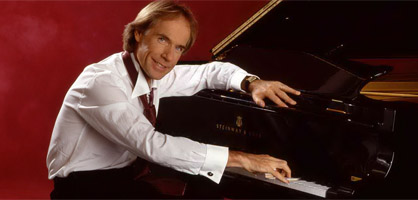
People have one of two reactions to the music of French pianist Richard Clayderman – they love it or hate it. For every person who finds his instrumentals hard to distinguish from anonymous elevator music and too populist to be considered classical, there’s the legion of fans who have bought 75 million of his albums.
Clayderman has long been aware that he can polarise people, but he’s not one to pooh-pooh critics. “Sometimes I have very good critics, sometimes I have very bad critics. But it’s funny because my music is not really classical. It is between popular and classical music, so it’s sometimes very difficult for critics to analyse.
“For me, what is important is when my audience is very happy and when I have a good time on stage – where there’s a good rapport between my audience and me,” he says. “But critics are very important. Sometimes I understand [why it] happens.”
Clayderman’s fans are also important. They can send him a self-addressed envelope and he’ll send them an autographed photograph.
“I try to answer all of their letters. I’m very happy to sign an autograph and put a few words for my fans. Audiences are always nice with me and very gentle. There is a good link with my fans and me. It’s great to have this kind of audience.”
It’s also an audience he’s built over up over many years. Long before the likes of Dutch crossover violinist Andre Rieu, Clayderman enchanted Kiwis with his instrumentals.
His breakthrough was Ballade Pour Adeline, written in 1977 by French music producer Olivier Toussaint to mark the birth of Adeline, daughter of his musical partner Paul de Senneville.
The instrumental slowly climbed up the charts around the world over five years. In New Zealand it was a hit in 1981. Clayderman, then in his 20s with unfashionable long hair, beamed a big smile on the cover of his record in thousands of Kiwi living rooms.
He further endeared himself here when he recorded a version of Pokarekare Ana in 1984.
Clayderman has kept up his recording output and touring – he once played 200 shows in 250 days. But his original studio albums are now rare and have yet to be reissued. Instead, much of his music is on a multitude of compilation albums or box sets, including one massive 16 volume collection. His website lists a staggering 200 plus albums.
The last time he played New Zealand was in 1985, so to see new studio album Romantique make the top 10 in New Zealand charts had him smiling. “It’s been successful in Europe and South America, but I’m very happy to have it in the charts in New Zealand. With this album it’s a good time to be back.”
The album includes a rerecorded version of Ballade Pour Adeline and a piano instrumental of Adele’s hit Someone Like You. Rather than a treacly interpretation, Clayderman unexpectedly retains some of the grunt of the original. “I had some meetings in London and I was given a lot of ideas for the repertoire. It was the melody,” he says of her song. He’s still to get feedback from Adele herself, but hopes to meet her.
Ad Feedback
“I always try to bring my emotion, my sensitivity. There are a lot of piano players around the world who play very well. But I try to bring my personality when I play.”
And the fact Clayderman covers Adele, Leonard Cohen’s Hallelujah and Nessun Dorma on the same album isn’t unusual for him. Pop is as much part of his background as classical.
His father, a piano teacher, taught him to play from age five. “It was always a pleasure for me to sit in front of the piano and play. I had to practise every day.”
At age 12 he was accepted at a Conservatoire of Music where, at 16, he won first prize. Clayderman’s trajectory then appeared to be successful classical pianist. Instead, he quit and formed a rock band.
“It was great for me. I had a lot of opportunities to meet musicians and play rock’n’roll music and play in groups. It was exactly what I wanted to do with the music.”
It was also for practical reasons. Clayderman says he earned a living from playing rock and used some of his earnings to help his father, who was ill. He also had stints as a session musician for recordings, including work with several French singers, which he enjoyed. But the long hours came with a price. He even had to have an operation for an ulcer. “I think it was because I was always playing and sleeping very late. I didn’t drink alcohol but it was a very stressful period.”
Then in 1976 he was discovered by Toussaint and de Senneville. Clayderman says he was surprised at just how quickly he became successful under their wing, but it’s left him with an attitude of not taking his audience for granted. “That’s why I try to be professional and do my best when I play the piano because this career is something special. I didn’t imagine that one day I would be this fortunate,” he says, then adds: “I’m quite shy.”
THE DETAILS
Richard Clayderman performs at Wellington’s Michael Fowler Centre on June 21, Napier’s Municipal Theatre on June 22 and Auckland’s Civic Theatre on June 23.
–